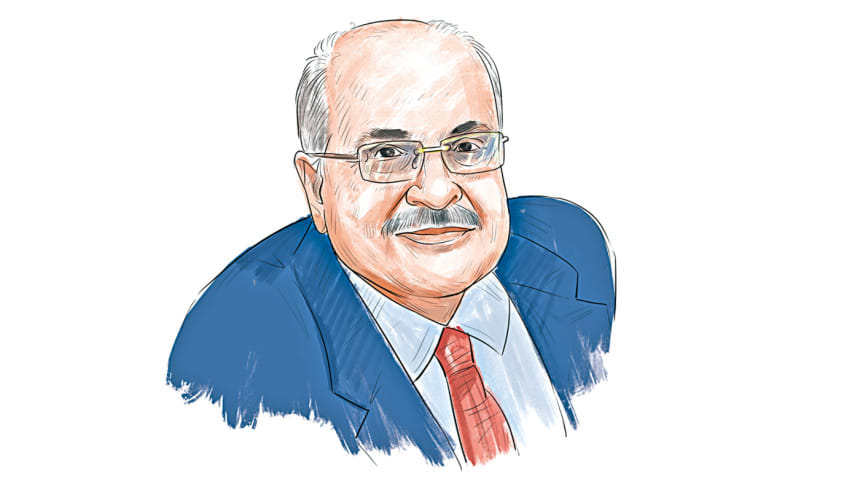Originally posted in The Daily Star on 9 September 2025
Star interview
Graduation from LDC: ‘We have 2.5 options to seek deferral’
Debapriya says decision must rest on solid evidence, strong backing from dev partners

Bangladesh should view its LDC exit not as a burden but as a milestone, an opportunity to advance long-delayed reforms for structural transformation of the economy, economist Debapriya Bhattacharya has said.
Asked what options Bangladesh has if it wants more time, Debapriya told The Daily Star in a recent interview that there are “two and a half” routes.
Debapriya, distinguished fellow at the Centre for Policy Dialogue (CPD), is an independent expert serving on the UN CDP. He is also the country rapporteur for Lao PDR.
This newspaper spoke to him amid local entrepreneurs’ fear that their businesses will be severely affected as Bangladesh prepares to graduate from the Least Developed Countries (LDCs) group in November 2026.
A group of businessmen is preparing to send letters to the chief adviser and the UN secretary-general, requesting a deferment of five to six years.
Bangladesh has already demonstrated its strength by meeting all three required criteria — per capita income, human asset index, and economic vulnerability index — twice since 2018, under two triennial reviews by the UN Committee for Development Policy (UN CDP), which decides on LDC graduation. The country also received a two-year extension due to the Covid-19 pandemic.
Business leaders argue that Bangladesh’s economic vulnerabilities differ from Lao PDR and Nepal, who are also set to graduate alongside Bangladesh.
TRADITIONAL CHOICES
Of the two and a half options Bangladesh has to seek the deferral, the first is for the head of government to write to the UN CDP, citing “unforeseen” and “beyond control” circumstances that require more time beyond 2026, Debapriya said.
The CDP would then form a sub-committee to examine the situation based on relevant data and information, and make recommendations to the full body.
This is how the Solomon Islands secured a three-year deferment in 2023, endorsed by the UN General Assembly (UNGA), with strong backing from Australia. The country is now set to graduate in 2027.
The second option is to write directly to the UN secretary-general, after which the request would go to the General Assembly for decision.
In December 2023, the UNGA indefinitely deferred Angola’s graduation after oil price shocks pulled its indicators below thresholds. Angola’s graduation process will restart only once it again meets the criteria.
Debapriya noted that navigating the General Assembly requires influential patrons, as illustrated in Angola’s case, where Portugal played a key role.
NEW ENTRY POINT
The “half option”, Debapriya explained, lies in the Enhanced Monitoring Mechanism (EMM), which tracks graduating and recently graduated countries. He currently leads this process in the CDP.
On August 25, 2025, the CDP chair wrote to the Bangladesh government, along with other graduating countries, seeking reports on progress in implementing Smooth Transition Strategies (STS).
A consultation between the CDP and Bangladesh may take place on November 25, 2025, where the country’s EMM report will be discussed.
How Bangladesh presents its case in that report will influence any subsequent request for deferment. The EMM assesses not only the three main criteria but also a wide range of Supplementary Graduation Indicators (SGI). The CDP will review these reports at its February 2026 plenary.
MISCONCEPTIONS
Debapriya noted several misconceptions about deferments. For example, it is often claimed that Myanmar chose to delay its graduation.
In reality, although Myanmar was willing, the CDP withheld its 2021 decision due to uncertainty following the February 1, 2021 military takeover. The decision was later deferred to 2024, and again to 2027.
He also highlighted that many LDCs remain stuck in the graduation pipeline, particularly small island developing states (SIDS) such as Tuvalu and Kiribati (since 2009), with later additions including Comoros and Djibouti. These countries remain highly vulnerable to climate and external shocks.
Meanwhile, Rwanda, Tanzania, and Uganda are expected to join the pipeline soon. If Bangladesh opts for deferment, it would stand as the only South Asian country other than Afghanistan still in the LDC group.
Debapriya stressed that any decision to seek deferral has to be very well thought out, and based on compelling empirical evidence and with expressed political support from the international development partners.
He also pointed out that the process would require rescinding the March 13, 2025 decision by the cabinet of advisers confirming Bangladesh’s graduation in November 2026.


